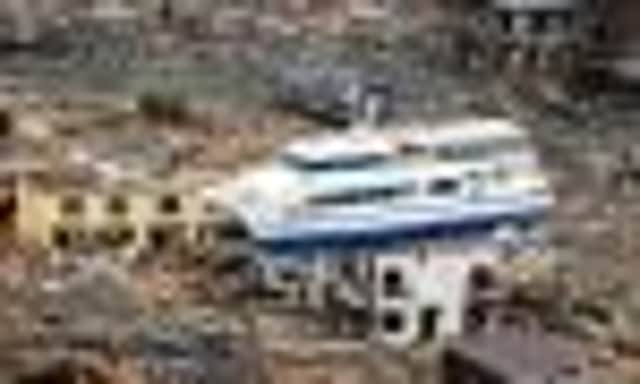Japan remembers Fukushima as clean up continues


So far, the massive task of disposing the debris has been anything but clean. Workers, often poorly trained or equipped, have dumped contaminated waste with scant regard for regulations or safety, and organised crime has infiltrated the clean-up process.
The mountains of rubble and piles of smashed vehicles scattered along the coast only hint at the scale of the debris removed so far. To clear, sort and process the rubble, and a vastly larger amount of radiation-contaminated soil and other debris near the nuclear plant in Fukushima, the government is relying on big construction companies – and some of the sub-contractors they use have been infiltrated by Japan’s infamous yakuza gangs.
Advertisement
Hide AdAdvertisement
Hide AdIn January, police arrested a senior member of Japan’s second-largest yakuza group, Sumiyoshi Kai, on suspicion of illegally dispatching three contracted workers to Date, a city in Fukushima struggling with relatively high radioactive contamination, pocketing one-third of their pay.
He told interrogators he came up with the plot to “make money out of clean-up projects” because the daily pay for such government projects, at about 16,000 yen (£112), was far higher than for other projects.
Meanwhile, workers complain of inadequate safety equipment and training for handling the hazardous waste they are clearing from towns, shores and forests after the meltdown of three nuclear plant reactor cores at Fukushima Dai-Ichi released radiation into the surrounding air, soil and ocean.
“We are only part of a widespread problem,” said a 56-year-old clean-up worker, who asked to be identified only by his last name, Nakamura, out of fear of retaliation. “Everyone, from bureaucrats to construction giants to tattooed gangsters, is trying to prey on decontamination projects. And the government is looking the other way.”
During a visit this weekend to Naraha, a deserted town of 8,000 that is now a no-man’s land within the 12-mile restricted zone around the crippled nuclear plant, workers wearing normal work clothes and surgical masks were scraping away topsoil, chopping tree branches and washing down roofs.
“They told me only how to cut grass, but nothing about radiation,” said Munenori Kagaya, 59, who worked in the nearby town of Tomioka, which is off-limits because of high radiation.
Labour shortages, poor management, and massive amounts of funds budgeted for the clean-up are a recipe for cheating.
The clean-up will leave Fukushima, whose farms and fisheries have been devastated by radiation fears, with 31 million tons of nuclear waste or more.
Advertisement
Hide AdAdvertisement
Hide AdThe process extends beyond Fukushima, to Iwate in the north and Chiba, which borders Tokyo, in the south. And the concerns are not limited to radiation. A walk through areas in Miyagi and Iwate that already were cleared of debris finds plenty of other toxic detritus, such as batteries from mobile phones, electrical wiring, plastic piping and gas canisters.
How well the debris and contaminants are being handled depends largely on the location.
Sendai, the biggest city in the region, sorted debris as it was collected and sealed the surfaces of areas used to store debris for processing to protect the groundwater, thanks to technical advice from its sister-city Kyoto, home to many experts who advised in the clean-up after the 1995 Kobe earthquake .
But Ishinomaki, a city of more than 160,000, collected its debris first and is only gradually sorting and processing it, said Shoji Nakayama of the National Institute for Environmental Studies.
“There were no technical experts there for the waste management side,” he said. “They did some good work with chemical monitoring but in total, risk assessment, risk management, unfortunately they did not have that expertise.”
Ultimately, just as they are choosing to live with contamination from chemicals and other toxins, the authorities may have to reconsider their determination to completely clean up the radiation, given the effort’s cost and limited effectiveness, experts say.
Regarding the nuclear accident, “there has been so much emphasis on decontamination that no other options were considered,” said Hiroshi Suzuki, a professor at Tohoku University in Sendai and chairman of the Fukushima Prefectural Reconstruction Committee.
“Some places, such as playgrounds, obviously must be cleaned up. But others, such as forests, should just be left alone, since gathering or burning radioactive materials concentrates them – the opposite of what is needed.”
Protesters call for rejection of nuclear power
Advertisement
Hide AdAdvertisement
Hide AdThousands of protesters marched in the Japanese capital yesterday calling on the government to shun nuclear power.
“It’s becoming more and more important for us to protest. I do this for my children, we can’t leave the mess of nuclear power behind to them,” said a 32-year old mother of two marching in front of the Ministry of Economy, Trade and Industry, chanting “Stop nuclear! Protect our children!”.
“People and the media are starting to forget Fukushima and what happened there,” said the woman.
All of Japan’s 50 nuclear reactors were gradually shut down after the Fukushima disaster and all but two of them remain idle.
But the sweeping December victory of prime minister Shinzo Abe and his Liberal Democratic Party (LDP), which long supported nuclear power and fostered ties between politicians, bureaucrats and utilities, is a worry for nuclear power’s opponents.
A recent survey showed about 70 per cent of Japanese want to phase out nuclear power eventually.
An equal number back Mr Abe, who wants to restart off-line reactors if they meet new safety standards.
Nobuko Kameyama, a 67-year old retired person who was handing out anti-nuclear leaflets at a train station, said many people were pre-occupied with a stagnant economy while progress made towards phasing out nuclear under the previous government was lost when it lost power.
“The movement seems to have gotten quieter because we had to go back to the drawing board when the LDP got voted back in,” Mr Kameyama said.